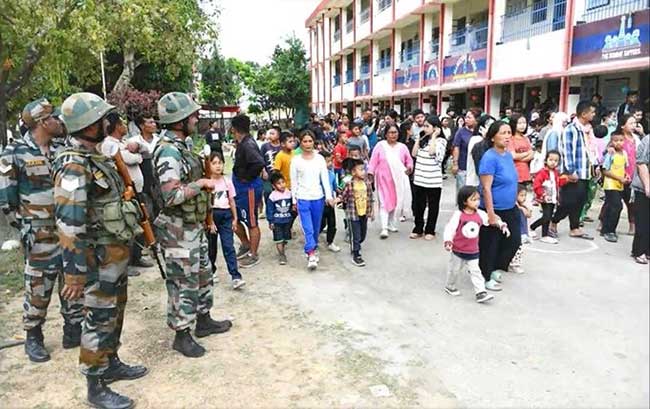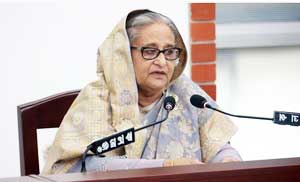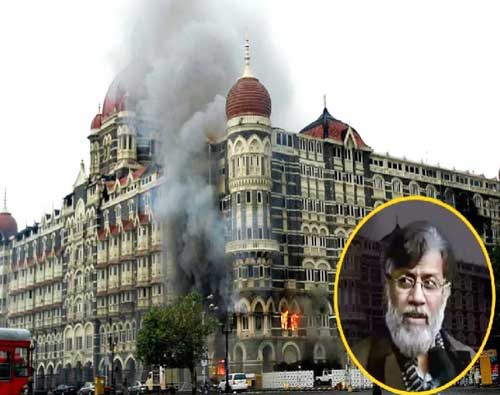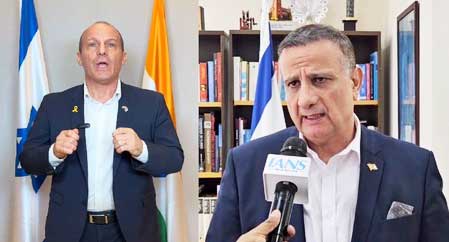The ugly face of ethnic conflict has once again returned to haunt Manipur, but this time its effect has also been felt in the other northeastern states and it may continue for a longer period.
In the wake of the ongoing unrest in Manipur, over 1600 people have crossed the border into Assam's Cachar district and more than 30 people, mostly women and children took shelter in Mizoram's Saitual district.
In a spillover of the ethnic violence in Manipur, members of the Kuki and Meitei communities clashed in the Meghalaya capital Shillong on Thursday night and the police have arrested 16 people in connection with the incident. Security was tightened further in the hill city.
Both the states' authorities have arranged temporary shelters at a few government schools and food and other necessary commodities have been provided to them.
Two Mizoram districts -- Aizawl and Saitual -- share around a 95 km border with Manipur, which has also 204 km and 225 km inter-state borders with Assam and Nagaland respectively.
Many tribal and non-tribal communities specially the Meitei, Naga, Kuki, Mizo, Chakma are living in different northeastern states presenting a complex linguistic mosaic with over 200 dialects.
The northeastern region is home to 45.58 million people (2011 Census). The indigenous tribals constitute around 28 per cent of the population and they mostly speak in their mother tongue or their indigenous language.
The tribals and non-tribals belong to Hindu, Christian and Muslim communities with different lifestyles, cultures, traditions and languages.
Any kind of negative incident involving one or two communities in a particular state often has a counter-effect in other states of the region causing ethnic trouble.
Besides the insurgency, Naga-Kuki, Meitei versus other tribals, Chakma versus other tribals, and numerous other ethnic conflicts have claimed thousands of lives and damaged huge property during the past many decades in the northeastern region.
From the beginning of this year, unrest resurfaced in Manipur for multiple reasons. On May 3, unprecedented violent clashes, attacks and arson broke out at various places during a 'Tribal Solidarity March' called by the All Tribal Students' Union of Manipur (ATSUM) to oppose the demand for inclusion of the Meitei community in the ST category.
Acting on a writ petition filed by the Meetei (Meitei) Trade Union, the Manipur High Court acting Chief Justice M.V. Muralidaran on April 19 had directed the state government to submit the recommendation for inclusion of Meitei (Meetei) community in the Scheduled Tribes (ST) list to the Union Tribal Affairs Ministry.
The High Court order said: "The issue of inclusion of the Meetei/Meitei community in the Scheduled Tribes list of the Constitution is pending for nearly ten years and above. No satisfactory explanation is forthcoming from the side of the respondent State for not submitting the recommendation for the last 10 years.
"Therefore, it would be appropriate to direct the respondent state to submit its recommendation to the Ministry of Tribal Affairs within a reasonable time."
The High Court order snowballed into a major controversy with thousands of tribals turning up for the �Tribal Solidarity March' in 10 hill districts on May 3 called by a student body.
Earlier a civil writ petition filed by eight members of the Meetei (Meitei) Tribe Union led by union secretary Mutum Churamani Meetei had sought the issuance of a writ of mandamus directing the first respondent (Manipur government) to submit a recommendation in reply to the Union Tribal Affairs Ministry's letter dated May 29, 2013.
According to the Meitei and other agitators, the influx of outsiders from both inside and outside the country, including people from Myanmar, Nepal and Bangladesh, has significantly affected the identity, culture, economy, administration and the environment of Manipur.
The Meitei community is demanding inclusion in the list of ST. Those demanding ST status claimed that there is a need to protect the valley inhabited by the Meitei community while tribals living in Manipur's hill area have already been protected as Scheduled Tribe category status.
The BJP led government in Manipur has claimed that the process is on to include Meiteis in the ST list.
The Central government, on December 11, 2019 at the height of the agitation against the Citizenship (Amendment) Act (CAA), introduced the ILP (Inner Line Permit) system to strictly monitor the movement of outsiders in the state and to protect the interests of the indigenous people.
The ILP under the Bengal Eastern Frontier Regulation, 1873, is an official travel document that allows an Indian citizen to visit the states where ILP is enforced for a limited period of time and with a specific purpose.
Manipur has witnessed a series of agitations for the past several months with many women, students and youth bodies and civil society organisations agitating against the state government's alleged "delaying tactics" in introducing the National Register of Citizens (NRC) in the state, and in the functioning of the Manipur State Population Commission (MSPC).
Manipur Chief Minister N. Biren Singh had said that his government is ready to implement the NRC in the state but to do that, approval from the Central government is required.
He said that the state government has already constituted the MSPC and it would identify the immigrants in the state based on the cut-off year of 1961.
"People of Myanmar seeking asylum in Manipur is a different issue. At any cost, we would protect the demography as well as the tradition and culture of the indigenous people of the state," Singh said.
Meanwhile, the Manipur government earlier decided to identify those Myanmarese refugees who have sought asylum in the northeastern state, and keep them at the designated detention centres.
So far, around 5,000 immigrants, including women and children, have fled from conflict-hit Myanmar after the military took power in the neighbouring country in February 2021.
An official said that the Manipur government has recently constituted a Cabinet Sub-Committee headed by Tribal Affairs and Hill Development Minister Letpao Haokip after thousands of Myanmarese crossed over to the state due to the armed conflict near the Indian border areas between the Myanmar Army and the People's Defence Force.
The hills account for 90 per cent of the state's area and 10 per cent population while the valley occupies 10 per cent land.
In the valley, there are Hindu, non-tribal Meitei communities while the hills are inhabited largely by the Christian Naga and Kuki-Zomi communities.
In another development, the North East Students' Organisation (NESO), an apex body of eight major students organisations of seven northeastern states, condemned the Manipur government's action evicting the indigenous settlers belonging to the Zo community and the violent incidents that followed.
"The tribals were evicted on the pretext that they are settling on reserve forest whereas the fact is that these indigenous settlers have been residing in these areas for ages."
"The government of Manipur has to take into account that these are the indigenous communities of northeast and have inhabited these lands from their forefathers and they are not illegal immigrants from Nepal or Bangladesh," NESO chairman Samuel B. Jyrwa and General Secretary Mutsikhoyo Yhobo said in a joint statement.




.jpg)



Bangladesh court issues fresh arrest warrant against 18, including former PM Hasina and daughter
A Bangladesh court on Thursday issued an arrest warrant against 18 people, including former Prime Minister Sheikh Hasina and her daughter Saima Wazed Putul, in a case filed on allegations of corruption in a plot allotment under the Purbachal New Town project, local media reported.
26/11 Mumbai terror attack mastermind Tahawwur Rana successfully extradited from the US: NIA
The National Investigation Agency (NIA) on Thursday announced that it had successfully secured the extradition of Tahawwur Hussain Rana, the mastermind of the deadly 26/11 Mumbai terror attacks, "after years of sustained and concerted efforts to bring the key conspirator behind the 2008 mayhem to justice".
Former NIA officer who interrogated Headley welcomes Tahawwur Rana’s extradition
Loknath Behera, former senior officer of the National Investigation Agency (NIA) and part of the team that interrogated David Coleman Headley -- the key conspirator in the 26/11 Mumbai terror attacks -- on Thursday expressed satisfaction over the successful extradition of Tahawwur Rana from the United States.
Tahawwur Rana extradition: Israel praises Modi govt for bringing terrorists to justice
Thanking the government led by Prime Minister Narendra Modi for its persistence in bringing terrorists to justice, Israel on Thursday welcomed the extradition of 26/11 plotter Tahawwur Rana from the United States to India.
As Rana lands in India, 26/11 martyr Tukaram Omble's brother demands hanging of Tahawwur
On the day Tahawwur Rana, one of the co-conspirators in the Mumbai terror attacks was brought to India, Eknath Omble, the brother of Ashok Chakra awardee and 26/11 martyr Tukaram Omble, urged the central government to hang the terrorist and send a strong message to Pakistan.
India and UK reaffirm free trade agreement, support supply chains
Amid the changing world trade order, India and the UK have reaffirmed their commitment to furthering the bilateral relations between the two nations, including continuing negotiations at pace towards a mutually beneficial Free Trade Agreement (FTA) and Bilateral Investment Treaty (BIT).
Centre appoints special public prosecutor for 26/11 Mumbai terror attack case
The Central government has appointed Advocate Narender Mann as the Special Public Prosecutor for the 26/11 Mumbai terror attack case hearing.